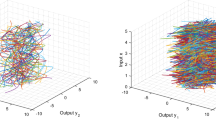Abstract
Let X t be an arbitrary additive process taking values in ℝd. Consider \(X_{t}^{*}=\sup_{0\le s\le t}\|X_{s}\|\) and a moderate function φ. We are able to construct a function a φ (t) from the characteristics of X t such that for all stopping times T, the ratio \(E\phi(X_{T}^{*})/Ea_{\phi}(T)\) is uniformly bounded away from 0 and ∞ by two constants depending on φ only. Let T r =inf {t>0:‖X t ‖>r}, r>0. Similarly, we can define a function g φ (r) in terms of the characteristics of X t such that c 1 g φ (r)≤Eφ(T r )≤c 2 g φ (r) ∀r>0 for good constants c 1, c 2 depending only on φ.
Similar content being viewed by others
References
De la Peña, V.H.: From boundary crossing of nonrandom functions to first passage times of processes with independent increments. Unpublished manuscript (1997)
De la Peña, V.H., Eisenbaum, N.: Exponential Burkholder Davis Gundy inequalities. Bull. Lond. Math. Soc. 29, 239–242 (1997)
De la Peña, V.H., Giné, E.: Decoupling: From Dependence to Independence. Springer, New York (1999)
De la Peña, V.H., Yang, M.: Bounding the first passage time on an average. Stat. Probab. Lett. 67, 1–7 (2004)
Graverson, S.E., Peskir, G.: Maximal inequalities for the Ornstein–Uhlenback process. Research Reports No. 393, Dept. Theoret. Statist. Aarhus (1998)
Hahn, M.G., Klass, M.J.: Matrix normalization of sums of random vectors in the domain of attraction of the multivariate normal. Ann. Probab. 8, 262–280 (1980)
He, S.W., Wang, J.G., Yan, J.A.: Semimartingale Theory and Stochastic Calculus. Kexue Chubanshe (Science Press), Beijing (1992)
Klass, M.J.: Toward a universal law of the iterated logarithm, Part I. Z. Wahrscheinlichkeitstheor. Verw. Geb. 36, 165–178 (1976)
Klass, M.J.: A method of approximating expectations of functions of sums of independent random variables. Ann. Probab. 9, 413–428 (1981)
Klass, M.J.: Uniform lower bounds for randomly stopped Banach space valued random sums. Ann. Probab. 18, 780–809 (1990)
Klass, M.J., Nowicki, K.: An optimal bound on the tail distribution of the number of recurrences of an event in product spaces. Probab. Theory Relat. Fields 126, 51–60 (2003)
Novikov, A., Valkeila, E.: On some maximal inequalities for fractional Brownian motions. Stat. Probab. Lett. 44, 47–54 (1999)
Peskir, G.: Bounding the maximal height of a diffusion by the time elapsed. J. Theor. Probab. 14, 845–855 (2001)
Pruitt, W.E.: The growth of random walks and Lévy processes. Ann. Probab. 9, 948–956 (1981)
Yang, M.: Occupation times and beyond. Stoch. Process. Appl. 97, 77–93 (2002)
Yang, M.: The growth of additive processes. Ann. Probab. 35, 773–805 (2007)
Author information
Authors and Affiliations
Corresponding author
Rights and permissions
About this article
Cite this article
Klass, M.J., Yang, M. Maximal Inequalities for Additive Processes. J Theor Probab 25, 981–1012 (2012). https://doi.org/10.1007/s10959-011-0357-4
Received:
Revised:
Published:
Issue Date:
DOI: https://doi.org/10.1007/s10959-011-0357-4
Keywords
- Additive processes
- Lévy processes
- Maximal inequalities
- Stopping times
- Random walks
- Moderate functions
- Sums of independent random variables




